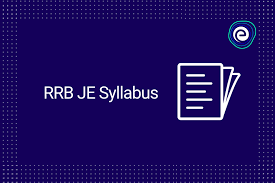
Railway Recruitment Board Junior Engineer (RRB JE) is a national level exam conducted to fill various vacancies of technical profile in the Indian Railways. Candidates from engineering and science backgrounds can apply for this exam. You need to understand the syllabus and the exam pattern. This will be a computer-based test and will include three stages i.e. – CBT-1, CBT-2, document verification and medical examination
The main aim of this exam is to ascertain that the candidate is capable of making quick and efficient decisions and is physically fit. This applies to all the posts of the RRB JE. Also, know that if you are in the last year of your diploma or degree, you cannot apply for this exam. For all the notifications and updates, you have to keep your eye on the online portal of RRB JE. To start with the preparation, it is important to understand the exam pattern and syllabus. Every vacancy will have a different syllabus, so make sure to have a detailed look at the syllabus. The vacancies of RRB JE are Junior Engineer (JE), Junior Engineer (IT), Chemical Material Superintendent (DMS), Chemical and Metallurgical Assistant (CMA).
You can visit BYJU’S Exam Prep to get study material, notes, test series for RRB JE exam.
Exam pattern of RRB JE:
- Stage one of CBT- Under this subjects like mathematics, general science, awareness, reasoning, etc are evaluated.
- Stage two of CBT- Under this subjects like technical reasoning, computer and applications, physics, chemistry, etc are covered.
- The medical and document verification stage- Various documents relating to nationality, category, domicile, education, etc are checked along with proofs. After completing the document verification successfully the candidate is sent for further medical fitness examination.
- Final selection intimation is given to the selected candidates.
Syllabus of the RRB JE mechanical exam:
The RRB JE ME syllabus is given below.
- Mathematics- Under this you must prepare in detail algebra, number system, profit, loss, time, distance, work, etc and every concept of mathematics.
- General science- Under this major subject like physics, chemistry, and life sciences should be covered.
- General awareness- Try to cover every information relating to polity, environment, scientific field, sports, geography, history, etc.
- Basics of computer- Under this the candidate must be good enough in understanding the basic concepts of computer applications.
- Engineering mechanics- This solution is devoted to the solution of mechanics problems through the integrated application of mathematics and engineering principles. The main emphasis is laid on the physical principles of modern engineering design.
- Material science- This study is all about the properties of solid materials and also how to determine them with the help of material composition and structure. The material science study is followed by four categories including metals, polymers, semiconductors and ceramics. This will also cover mechanical properties of the material- tensile strength, ductility, hardness, toughness, brittleness etc.
- Strength of material- Also, known as mechanics of material, this will tell you the ability to withstand an applied load failure or any plastic deformation. This study will calculate the stresses and strains on the materials.
- Machining- This study includes the working principle of lathe, general and special operations, cutting fluids, coolants and lubricants, introduction to shaper, slotter, plainer, heat treatment process applied to gears.
- Welding- This set includes introduction and classification of welding processes, pros and cons of welding, arc welding, choice of electrodes, gas welding, applications of solders and fluxes, flame-cutting processes etc.
Other subjects like grinding and finishing process, metrology, fluid mechanics and hydraulic machinery, industrial management and thermal engineering. It is important to prepare well for these subjects to ace the exam.
Checkout here – Preparation Tips and Strategy to Crack RRB JE